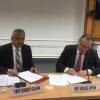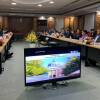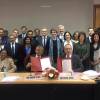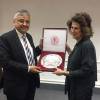New research and education partnership announced between UCL and AIIMS
22 February 2019
UCL and the All India Institute of Medical Sciences (AIIMS) have entered into a new partnership which will enable much closer research collaboration and will explore opportunities to increase academic and student exchange between the institutions.
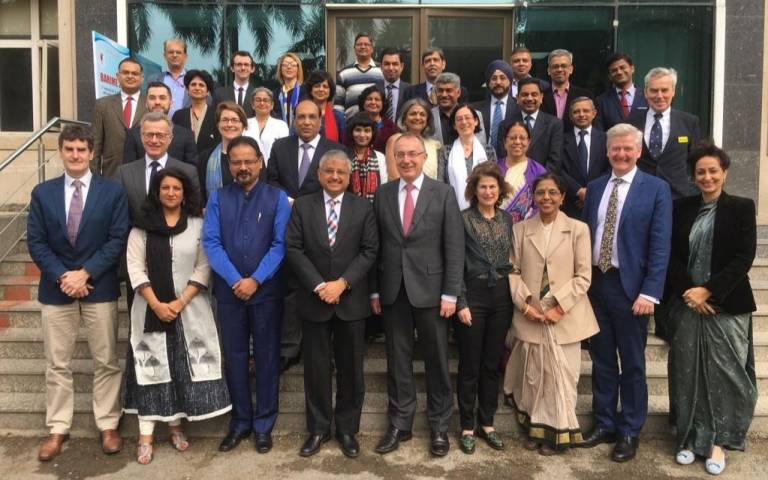
As part of this commitment, UCL is pleased to announce AIIMS has joined the new International Centre for Genomic Medicine in Neuromuscular Diseases (ICGMN), which is led by UCL.
The ICGMN is a £5m initiative, bringing together skills and resources from five countries and aims to advance the genetic diagnosis and therapy for patients with muscle wasting neuromuscular diseases, including motor neurone disease and muscular dystrophy, which affect at least 17m children and adults globally.
As a part of the Centre’s research, AIIMS will soon launch its first patient trials. These trials will provide a better understanding of the different genes present in India’s populations, which affect neuromuscular diseases, and this insight could lead to better treatments.
On Friday 22 February 2019, a Letter of Intent was signed between UCL’s President and Provost, Professor Michael Arthur, and AIIMS’ Director, Professor Randeep Guleria.
“We are delighted to have signed a ‘Letter of Intent’ with AIIMS, agreeing to explore further how we might build on our strong relationship. Our existing collaborative activities span a range of areas in health and engineering, developed over a number of years,” said UCL President & Provost, Professor Michael Arthur.
“Through closer collaboration and sharing of our complementary expertise, UCL and AIIMS will gain a deeper insight into ground-breaking research and seek to fulfill our joint ambition to address some of the biggest challenges facing society today.
“Jointly seeking to further academic and student opportunities to work together more closely, will also enrich both UCL’s and AIIMS’ communities, enabling them to develop and grow intellectually, culturally and socially.
“This sits really well with UCL’s approach to global engagement - building mutually beneficial partnerships, based on trust and respect, in this case between UCL and AIIMS.”
In 2018 the UCL Queen Square Institute of Neurology led a successful £3.66m bid to the Medical Research Council (MRC) to establish a brand new International Centre for Genomic Medicine in Neuromuscular Diseases. An additional £2m was contributed by UCL and UK collaborators Newcastle and Cambridge Universities.
The aim of the Centre is to develop an international fellowship programme in genomic medicine, to increase the number of neuromuscular disease patients with an accurate genetic diagnosis, and to build "trial ready" cohorts and ultimately improve health outcomes for patients.
Staff and resources from international centres in India, Brazil, Turkey, South Africa and Zambia will be central to the partnership.
Director of the UCL Queen Square Institute of Neurology and Director of the ICGMN Professor Michael Hanna, said: “Our vision is to create a transcontinental genomics research and capacity building partnership between the UK with excellent centres such as AIIMS.
“We will discover new disease genes, define the genetic variants in known neuromuscular genes, understand comparative genetic architecture in different populations and explore disease mechanisms.
“We will dramatically increase the number of patients with an accurate genetic diagnosis, build 'trial ready' cohorts and ultimately improve health outcomes for patients with this unmet health need drawn from a combined population of over 1.5 billion people.”
AIIMS investigators will recruit, phenotype and genotype around 1,000 Indian patients during the next 5 years creating a unique highly phenotyped "trial ready" patient cohort. In addition, the partnership will support a unique clinical training fellowship programme for Indian neurologists to become the genomic medicine experts of the future in India.
Professor of Neurology at AIIMS, Padma Srivastava, said: “The AIIMS neurology team is delighted to be part of this major new MRC funded international genomics initiative with UCL.
“It will enable us to jointly train Indian fellows in genomic medicine, to understand the genetic architecture of neuromuscular diseases in India and to build 'trial ready' cohorts of patients.
“We believe this collaborative initiative will enable a step change in genomic medicine in neuromuscular diseases and will be a template for genomic understanding other neurological diseases in India.”
Professor Hanna added: “I am very pleased to be working with outstanding principal investigators at AIIMS to ultimately advance genetic diagnosis and therapy for patients with neuromuscular diseases, diseases which affect at least 17m children and adults globally."
Last year UCL academics specialising in medical research, healthcare technologies and frugal innovation welcomed AIIMS colleagues to London to discuss this future collaboration.
Dr Dame Nicola Brewer (UCL Vice Provost-International) said: “This initiative connects experts in the UK, India, Turkey, South Africa and Zambia in a significant global partnership.
“This international partnership will help to train a new generation of clinical academics who we hope will become leaders of genomic medicine and specialist care delivery in each of the partner countries – making a reality of co-creating wise solutions to global challenges as well as developing independent research capability on a global scale.”
The new International Centre will be officially launched by Professor Fiona Watt, CEO of the Medical Research Council, at a reception hosted by Lord Kakkar at the House of Lords on 3rd April 2019 and senior colleagues from AIIMS will attend.
Links
- UCL Queen Square Institute of Neurology
- Queen Square Centre for Neuromuscular Diseases
- UCL Brain Sciences
- Professor Michael Hanna's academic profile
- All India Institute of Medical Sciences (AIIMS)
- Medical Research Council
- Media coverage
Image
UCL
Media contact
Chris Lane
tel: +44 20 7679 9041
E: chris.lane [at] ucl.ac.uk
 Close
Close


